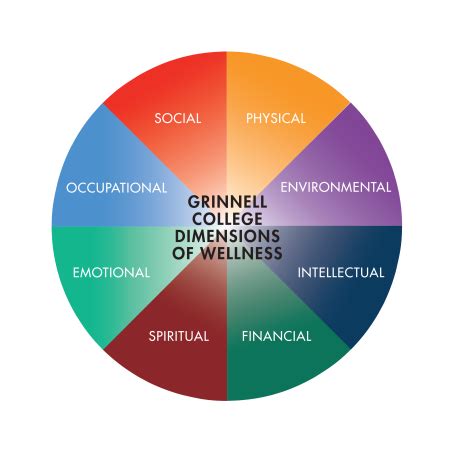Intro
Discover the difference between Health and Wellness, exploring physical, mental, and emotional wellbeing, self-care, and holistic approaches to achieve overall wellness and a healthy lifestyle.
The terms "health" and "wellness" are often used interchangeably, but they have distinct meanings. Health refers to the absence of disease or illness, while wellness encompasses a broader range of aspects, including physical, mental, and emotional well-being. Understanding the difference between these two concepts is essential for individuals seeking to improve their overall quality of life. In today's fast-paced world, it's easy to get caught up in the idea that being healthy is the ultimate goal, but wellness is what truly allows us to thrive. As we delve into the world of health and wellness, it becomes clear that these two concepts are interconnected yet distinct.
The pursuit of health is often focused on treating illnesses or preventing diseases. This can involve regular check-ups with healthcare professionals, following a balanced diet, and engaging in physical activity. While these habits are crucial for maintaining good health, they only scratch the surface of what it means to be well. Wellness, on the other hand, is a holistic approach that considers the intricate relationships between physical, mental, and emotional aspects of our lives. It's about cultivating a sense of purpose, building strong relationships, and finding joy in everyday activities. By prioritizing wellness, individuals can experience a profound sense of fulfillment and happiness that goes beyond just being healthy.
As we explore the complexities of health and wellness, it becomes apparent that these concepts are not mutually exclusive. In fact, they are deeply intertwined. Good health is often a foundation for overall wellness, and vice versa. When we prioritize our physical health, we're better equipped to handle the demands of daily life, which in turn can have a positive impact on our mental and emotional well-being. Conversely, when we focus on our mental and emotional wellness, we're more likely to make healthy choices that support our physical health. This synergistic relationship highlights the importance of adopting a comprehensive approach to health and wellness, one that acknowledges the intricate connections between these different aspects of our lives.
Understanding Health

Physical Health
Physical health is a critical component of overall health, and it's essential to prioritize it. This can involve engaging in regular physical activity, such as walking, running, or weightlifting, as well as maintaining a balanced diet that provides our bodies with the necessary nutrients. Adequate sleep is also crucial, as it allows our bodies to repair and rejuvenate themselves. By prioritizing physical health, individuals can reduce their risk of chronic diseases, such as heart disease, diabetes, and obesity, and improve their overall quality of life.Mental Health
Mental health is another vital aspect of overall health, and it's often overlooked. This can involve our emotional and psychological well-being, as well as our ability to cope with stress and adversity. When we prioritize mental health, we're better equipped to handle the challenges of daily life, and we're more likely to feel happy and fulfilled. This can involve practices such as meditation, mindfulness, and cognitive-behavioral therapy, among others. By prioritizing mental health, individuals can reduce their risk of mental health disorders, such as depression and anxiety, and improve their overall well-being.Exploring Wellness

Physical Wellness
Physical wellness is a critical component of overall wellness, and it's essential to prioritize it. This can involve engaging in regular physical activity, such as walking, running, or weightlifting, as well as maintaining a balanced diet that provides our bodies with the necessary nutrients. Adequate sleep is also crucial, as it allows our bodies to repair and rejuvenate themselves. By prioritizing physical wellness, individuals can reduce their risk of chronic diseases, such as heart disease, diabetes, and obesity, and improve their overall quality of life.Emotional Wellness
Emotional wellness is another vital aspect of overall wellness, and it's often overlooked. This can involve our ability to recognize, understand, and manage our emotions, as well as our ability to cope with stress and adversity. When we prioritize emotional wellness, we're better equipped to handle the challenges of daily life, and we're more likely to feel happy and fulfilled. This can involve practices such as mindfulness, meditation, and cognitive-behavioral therapy, among others. By prioritizing emotional wellness, individuals can reduce their risk of mental health disorders, such as depression and anxiety, and improve their overall well-being.The Connection Between Health and Wellness

The Benefits of Prioritizing Health and Wellness
Prioritizing health and wellness can have a profound impact on our overall quality of life. When we focus on our physical health, we're more likely to experience increased energy, improved mood, and enhanced cognitive function. When we prioritize our mental and emotional wellness, we're better equipped to handle stress and adversity, and we're more likely to feel happy and fulfilled. By adopting a comprehensive approach to health and wellness, individuals can reduce their risk of chronic diseases, improve their overall well-being, and experience a profound sense of fulfillment and happiness.Practical Tips for Prioritizing Health and Wellness

- Engage in regular physical activity, such as walking, running, or weightlifting
- Maintain a balanced diet that provides your body with the necessary nutrients
- Get adequate sleep, aiming for 7-9 hours per night
- Practice mindfulness, meditation, or cognitive-behavioral therapy to support mental and emotional wellness
- Connect with nature, whether through walking, hiking, or simply spending time outdoors
- Build strong relationships with friends and family, and prioritize social connections
- Engage in activities that bring you joy and fulfillment, whether through hobbies, creative pursuits, or volunteering
Overcoming Obstacles to Health and Wellness
Prioritizing health and wellness can be challenging, especially in today's fast-paced world. Common obstacles include lack of time, lack of motivation, and lack of resources. However, by adopting a comprehensive approach to health and wellness, individuals can overcome these obstacles and experience a profound sense of fulfillment and happiness. Here are some strategies for overcoming common obstacles:- Start small, setting achievable goals and gradually increasing your commitment to health and wellness
- Find activities that you enjoy, whether through exercise, hobbies, or creative pursuits
- Connect with others who share your interests and priorities, whether through social media, support groups, or community organizations
- Seek out resources and support, whether through healthcare professionals, wellness coaches, or online communities
What is the difference between health and wellness?
+Health refers to the absence of disease or illness, while wellness encompasses a broader range of aspects, including physical, mental, and emotional well-being.
How can I prioritize health and wellness in my daily life?
+Prioritizing health and wellness requires a comprehensive approach that acknowledges the intricate connections between physical, mental, and emotional aspects of our lives. This can involve engaging in regular physical activity, maintaining a balanced diet, getting adequate sleep, and practicing mindfulness or meditation.
What are some common obstacles to health and wellness, and how can I overcome them?
+Common obstacles to health and wellness include lack of time, lack of motivation, and lack of resources. However, by adopting a comprehensive approach to health and wellness and seeking out support and resources, individuals can overcome these obstacles and experience a profound sense of fulfillment and happiness.
As we conclude our exploration of health and wellness, it's clear that these two concepts are interconnected yet distinct. By prioritizing health and wellness, individuals can experience a profound sense of fulfillment and happiness that goes beyond just being healthy. We invite you to share your thoughts and experiences with health and wellness, and to join the conversation on social media using the hashtag #healthandwellness. Together, we can create a community that supports and prioritizes overall well-being, and that recognizes the intricate connections between physical, mental, and emotional aspects of our lives.
